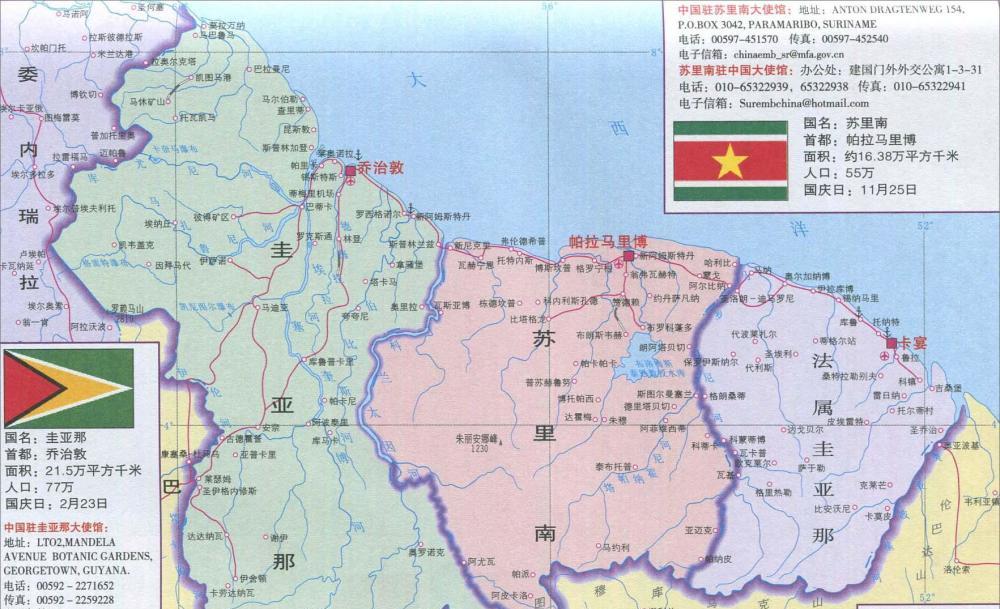Turning to the map of South America, we will find a small country called Suriname, which is tightly wrapped up in Brazil, Guyana and French Guiana. To tell the truth, there is no shocking history in this world's nine-rate small country, and it has no sense of existence in today's international community. However, Suriname is notable for one thing – among the country's many official legal languages, Chinese Hakka is also included. Why would a country that can't fight with us have eight rods to adopt the Chinese dialect as the legal language or even celebrate the Spring Festival? There is a rather tortuous history behind this.

Since the beginning of the Age of Discovery, the hegemony of western countries has gradually shifted from land to sea. In this process, the "sea coachman" Holland took the lead in tasting the sweetness with its powerful shipbuilding industry. Although Portugal, Spain and other countries were desperately trying to catch up behind them, by the middle of the 17th century, the Dutch colonial system around the world was still large and stable. In the eyes of the great powers, South America is undoubtedly a treasure land, as early as 1551, the Netherlands established colonies in South America, after the rise of Britain, it had a big fight with the Netherlands on the issue of colonial ownership in South America, but at that time, the "empire that never sets" was not yet full, and after several rounds of competition, the British found that they were not yet opponents, so they took the initiative to take a step back.
In 1667, the Dutch signed the Treaty of Breda with England, in which the Dutch traded the relatively barren state of New York in exchange for Suriname. A few years later, the Dutch themselves founded the "Big Apple" as the new capital of the world, but at that time, the Dutch were ecstatic and soon began a brutal plunder of Suriname.
To say that the colonial means of the great powers is nothing more than to drive out the local indigenous people or become slaves, to take the land for themselves, and to transport valuable things away. Naturally, the natives of Suriname could not resist the guns of the Western colonists, and they were placed in plantations or mines, where they worked hard day and night. The colonists only cared about their own interests, not the lives of the slaves, and finally one day, the slaves in a plantation finally could not hold back, they killed the white farmer in a rage, and then went into the primeval jungle, fighting a protracted war with the invaders in the face of geographical advantages.
The Dutch also thought simply: this group of slaves did not obey, and it would not be enough to capture another batch of slaves? However, everything is most afraid of the beginning, the success of a group of people to resist makes everyone want to move, no matter how many slaves the colonists capture, they either quickly run away at night, or they are rescued by others, the farmers are left with their personal wealth, but the rebels in the jungle gradually take shape, they simply raise the banner, shout "Down with colonialism", and open up with real knives and guns. Dutch colonists went out of their way to refer to them as "jungle blacks." By the mid-19th century, the Dutch position in the world colonial system had long been no better than the peak, and the "emancipation of black slaves movement" was in full swing, and the Dutch authorities sold a smooth water. In 1863, the government announced the abolition of black slavery in Suriname, and Surinamese were nominally granted the same status as whites.
Blacks are paid equally for equal work as whites, and the former is mostly uneducated, and many jobs are not done by white people, and if they are not done well by Surinamese, capitalists have to find cheaper and better quality labor. It just so happened that by the end of the 19th century, the Central Plains Empire, which had been brilliant for thousands of years, was rapidly declining on the distant East Asian continent. Under the ignorant closed country and "tributary diplomacy" policy of the rulers of the Qing Dynasty, China at that time saw that every day was worse than a day, and the people had to tighten their belts to pay off the debts of the imperial court without enough to eat, and they were hungry for a while. The Dutch saw the needle in the seam, immediately drove the ship to the southeast coast of China, recruited a large number of Chinese laborers, and many adventurous Chinese came to Suriname on dutch ships.
Chinese have always been industrious and kind, not only did a good job of the work entrusted to them by their employers, but also quickly mingled with Surinamese. Many of these Chinese laborers later turned into petty bosses, treating others with generosity in stark contrast to the brutal colonists. Not afraid of people than people, coming and going, not only do Surinamese respect Chinese more and more, but white people also appreciate Chinese. It is worth mentioning that Suriname has a small population, and when thousands of Chinese laborers poured into the country, they soon became a very influential group in Surinamese society.
Today, Chinese and Chinese culture are deeply engraved in the bones of Suriname, the Surinamese government has designated Chinese Hakka as one of the official legal languages, and in April 2014, they also designated the Chinese Lunar New Year as a permanent national public holiday, a national holiday – this is not only convenient for chinese in Suriname to celebrate the festival on this day, but even many Surinamese locals will spend the festival with overseas Chinese without any sense of violation.